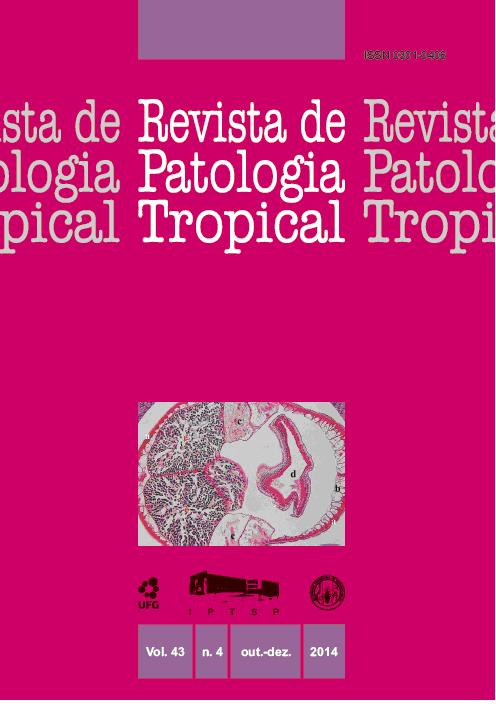Giardia lamblia: diagnosis using microscopic methods and enzyme-linked immunosorbent assay (ELISA).
DOI:
https://doi.org/10.5216/rpt.v43i4.33602Keywords:
Giardiasis, diagnosis, epidemiology.Abstract
The protozoan Giardia lamblia is one of the etiological agents of diarrhea in children in Brazil, anddiagnosis may be difficult due to low sensitivity of the methods commonly used, due the intermittentliberation of cysts, which may lead to false-negative results. Thus, an enzyme-linked immunosorbentassay (ELISA) was developed for detection of G. lamblia antigens in fecal samples, consideringthat this immunoassay has been described to be simple, sensitive and specific when applied todiagnose various parasitic diseases. Thus, this study aimed to compare the ELISA technique withsingle stool sample to examination methods using centrifugal sedimentation (Ritchie technique) andcentrifugation-flotation (Faust technique), intending to demonstrate the importance of a method withgreater sensitivity. Fecal samplesfrom a total of 158 children aged 0-12 years, were examined in apublic municipal nursery in the city of Rio Grande, Rio Grande do Sul, Brazil. The comparative resultsof the investigated techniques showed that ELISA has 3.0 times more chance than centrifugationflotation,and 3.4 times more chance than centrifugal sedimentation to detect positive samples ofG. lamblia. Overall, it was concluded that the ELISA was more efficient than the routine laboratorytechniques for the diagnosis of giardiasis, and it may be used for both individual and epidemiologicalassessments, as the technique allows for processing of multiple samples simultaneously.Downloads
Downloads
Published
How to Cite
Issue
Section
License
The manuscript submission must be accompanied by a letter signed by all authors stating the full name and email address, confirming that the material has not been published or is under consideration for publication elsewhere, and agreeing to transfer copyright in all media and formats for Journal of Tropical Pathology. The authors will not be paid for published articles. They are solely responsible for the content of those articles, even if the Editor holds the right to adjust them to the norms of the journal.
The reviewers will not be paid for the peer review process.

